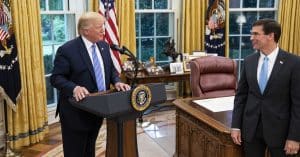White House claims authority to sanction AP
The White House under President Donald Trump has stirred controversy by enforcing a mandate to rename the Gulf of Mexico as the Gulf of America, leading to sanctions against the Associated Press for noncompliance, MSN reports.
The renaming directive has sparked heated debates about press freedom and the extent of government control over media narratives.
White House's Renaming Decree Sparks Debate
President Donald Trump recently initiated a decree mandating the renaming of the Gulf of Mexico to the Gulf of America. This decision has faced resistance from various media outlets, notably the Associated Press (AP), which opted to continue referencing the body of water by its traditional name. The Gulf of Mexico, recognized for over 400 years, borders the United States, Mexico, and Cuba, making it an international entity.
The AP’s decision not to conform to the presidential decree has led to significant repercussions. The White House has responded by barring AP journalists from attending certain events, including a specific swearing-in ceremony. This action by the administration has intensified debates over the balance between governmental authority and press freedoms.
According to White House Press Secretary Karoline Leavitt, the decision to rename the Gulf was already formalized by the Interior Secretary in official documents. Leavitt articulated, "It is a fact that the body of water off the coast of Louisiana is called the Gulf of America, and I’m not sure why news outlets don’t want to call it that."
Media Outlets React to Name Change
While AP held its ground on using the historical name, other major news organizations have also reacted to the White House's directive. The New York Times and The Washington Post decided to continue using “Gulf of Mexico” predominantly in their reporting. Meanwhile, Fox News announced its compliance with the new nomenclature, opting to use “Gulf of America” in its coverage.
Further complicating the landscape, Google Maps now displays "Gulf of America" within the U.S., while maintaining "Gulf of Mexico" in Mexico and some international locales. It appears Google has taken a blended approach in different regions, reflecting the ongoing dispute.
This shift in naming conventions has caught the attention of press freedom advocates and legal experts who have expressed concerns over potential government overreach. Noted attorney Floyd Abrams stated, “Barring an AP journalist from covering an Oval Office event because the AP has not adopted President Trump’s change of name...is an affront to the First Amendment.”
Press Freedom Concerns Over Government Actions
The Inter-American Press Association has joined voices in criticizing the White House's actions. José Roberto Dutriz, a representative from the association, commented that the restrictions on press coverage and warnings to the AP underscore a concerning trend. "Restricting press coverage and warning against the AP demonstrate a troubling intention to impose official criteria on public interest information, with the threat of reprisals for those who do not comply," he warned.
Additionally, the White House has been steadfast in its position regarding who may attend presidential events, stating that attendance is a controlled privilege. Leavitt reiterated, “Nobody has the right to go into the Oval Office and ask the president of the United States questions. We reserve the right to decide who gets to go into the Oval Office.”
AP Editor Julie Pace weighed in on the implications of the White House's decisions, arguing, “The actions taken by this White House were plainly intended to punish the AP for the content of its speech. It is among the most basic tenets of the First Amendment that the government cannot retaliate against the public or the press for what they say.”
Broader Implications of Renaming Efforts
The controversy surrounding the renaming of the Gulf of Mexico is not an isolated incident. President Trump has also taken steps to revert the name of the famous Alaskan peak from Mount Denali back to Mount McKinley. This pattern of name changes hints at a broader strategy of asserting influence over geographic nomenclature associated with U.S. territories.
Fox News' decision to align with the administration’s naming underscores the media divisions exacerbated by political pressures. While some outlets adapt to new directives, others maintain a commitment to traditional nomenclatures, highlighting varying editorial policies.
As tensions between media entities and the White House evolve, this situation raises key issues about the role of governmental influence in journalism. The debate continues to unfold, with press advocates and legal experts closely monitoring potential implications for freedom of expression.
Concluding Thoughts on the Unfolding Situation
The decision to rename an internationally recognized body of water has sparked a significant dialogue about the relationship between the government and the media. As events progress, the landscape of both press practices and governmental strategies remains under scrutiny. The interplay between media independence and political authority will undoubtedly shape future discussions.
Both within and outside the U.S., the world watches as this complex story of nomenclature, power, and press freedom develops further. The influence of governmental declarations on established geographic terms continues to be interrogated within media circles and beyond.




